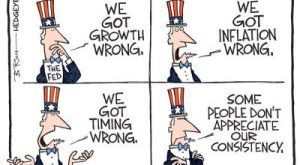In the 1870s, a handful of aspiring economists hoped to make economics a science as reputable as physics. Awed by Newton’s insights on the physical laws of motion – laws that so elegantly describe the trajectory of falling apples and orbiting moons – they sought to create an economic theory that matched his legacy. And so pioneering economists such as William Stanley Jevons and Léon Walras drew their diagrams in clear imitation of Newton’s style and, inspired by the way that...
Read More »John Tavener
[embedded content] Advertisements
Read More »David Ricardo and comparative advantage — a bicentennial assessment
David Ricardo and comparative advantage — a bicentennial assessment Two hundred years ago, on 19 April 1817, David Ricardo’s Principles was published. In it he presented a theory that was meant to explain why countries trade and, based on the concept of opportunity cost, how the pattern of export and import is ruled by countries exporting goods in which they have comparative advantage and importing goods in which they have a comparative disadvantage....
Read More »Is having infinitely many models really a sign of progress in economics?
Is having infinitely many models really a sign of progress in economics? In Dani Rodrik’s Economics Rules it is argud that ‘the multiplicity of models is economics’ strength,’ and that a science that has a different model for everything is non-problematic, since economic models are cases that come with explicit user’s guides — teaching notes on how to apply them. That’s because they are transparent about their critical assumptions and behavioral...
Read More »Nicholas Georgescu-Roegen
[embedded content] C’est vraiment incroyable que l’économie orthodoxe ait toujours négligé The Entropy Law and the Economic Process, un ouvrage fondamental et aussi important dans l’histoire de la pensée économique que General Theory de Keynes. Advertisements
Read More »Cutting wages is no panacea
Cutting wages is no panacea Falling wages might provide a short-term boost to corporate profits, but the reduced purchasing power of working people would soon cause people to buy less. That is disastrous in advanced capitalist countries, where consumer spending generally accounts for anywhere from 60 to 70 percent of gross domestic product … Falling wages were a reality during the Great Depression, but that didn’t help matters. By 1933 in the United States,...
Read More »Learning to think like an economist
Learning to think like an economist It takes some courage, maturity, and perception for the self-discovery that one is engaged in a fraudulent enterprise … Our teachers never talked about ideologies or the larger issues, and seemed content with discussing arcane mathematics — DELIBERATE deception involves knowing the truth and then using lies to hide it.This does not seem to be the modus operandi. Rather, after the initial discomfort of swallowing certain...
Read More »Mainstream ‘pluralism’
[h/t Unlearning Economics] The only economic analysis that mainstream economists accept is the one that takes place within the analytic-formalistic modeling strategy that makes up the core of mainstream economics. All models and theories that do not live up to the precepts of the mainstream methodological canon are pruned. You’re free to take your models — not using (mathematical) models at all is considered totally unthinkable — and apply them to whatever you want — as long...
Read More »Economics — an empty and inexact science
Economics — an empty and inexact science Of course economics involves cases where economists appear too reluctant to give up their favoured models. You can find similar stories in the hard sciences. There will be more such stories in economics because the inexact nature of economics makes it easier to discount any single piece of evidence. What I cannot understand is what leads someone … to argue against the use of evidence, and instead that “economics is...
Read More »Yes — there is something really wrong with macroeconomics
Yes — there is something really wrong with macroeconomics One way that macroeconomics stands out from other fields in economics is in how often it produces forecasts. The vast majority of empirical models in economics can be very successful at identifying causal relations or at fitting explaining behavior, but they are never used to provide unconditional forecasts, nor do people expect them to. Macroeconomists, instead, are asked to routinely produce...
Read More » Lars P. Syll
Lars P. Syll








